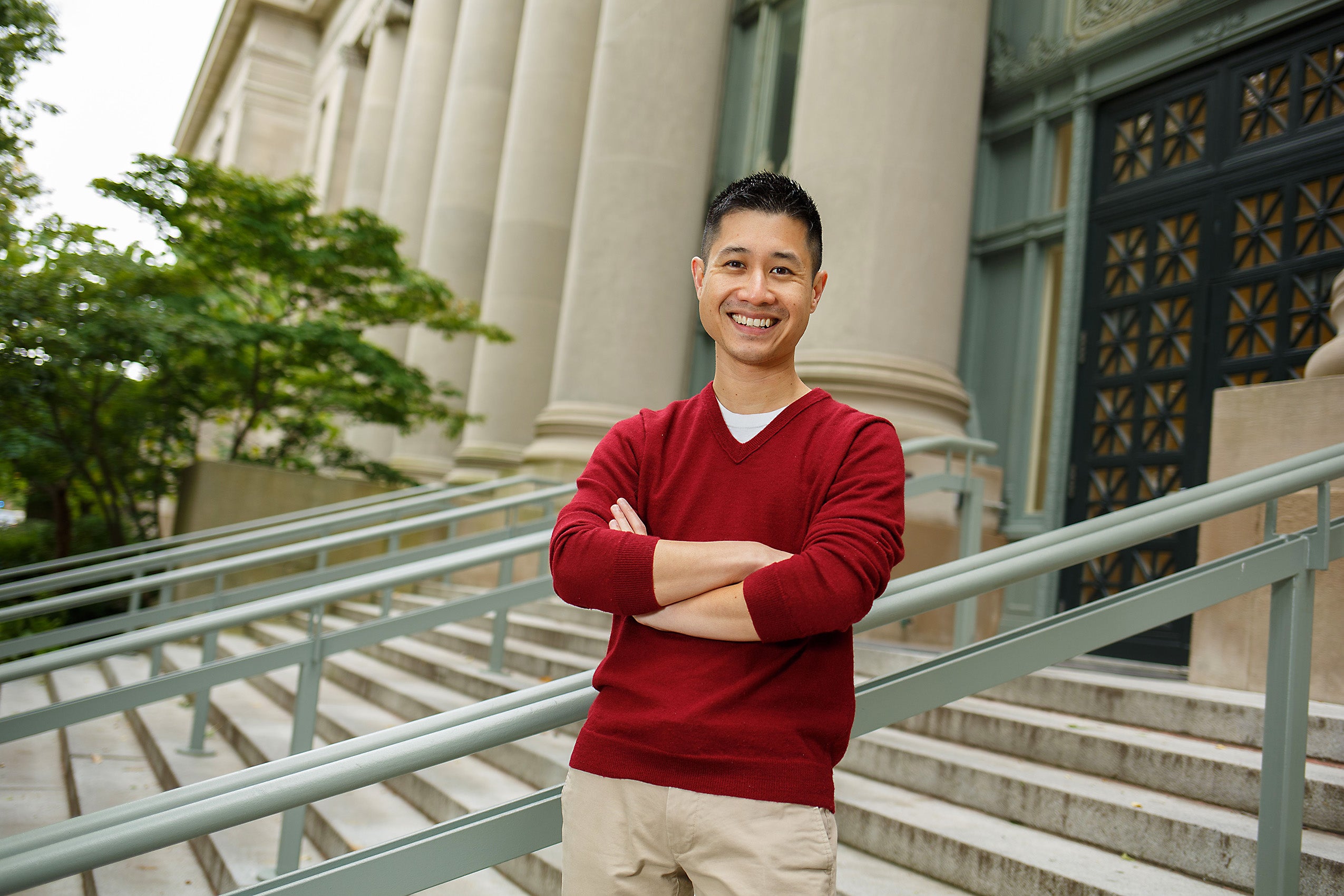Lieutenant Commander Anthony P. “Tony” Sham LL.M. ’20 was just three years out of law school when he deployed to Logar Province in Afghanistan, one of the most dangerous regions in the country, to serve as primary legal adviser to American military leaders on matters of Afghan criminal procedure, Afghan constitutional law, and evidence-based operations. While assisting the local government in prosecuting terrorists, Sham worked in partnership with Afghan prosecutors, judges, and security forces, and he developed a curriculum to educate Afghan National Police and Afghan National Army on Afghan substantive law, legal search and seizure procedures, and police tactics.
Carrying that level of responsibility so early in his career—and getting lots of courtroom experience, as he did in his first military assignment, as a criminal defense attorney—was exactly why Sham, a native of Dallas, joined the U.S. Navy right out of Baylor Law School. This year, Sham is getting his LL.M. at Harvard Law School with a focus on international law and national security law, with plans of becoming a legal adviser to senior leaders at Department of Defense.
“This is my chance to take off my uniform and live within the civilian population and get their perspectives.”
Anthony Sham LL.M. ’20
“I’ve always said that I won’t get out [of the Navy] until it doesn’t seem interesting anymore,” says Sham, who is living at Hanscom Air Force Base in Bedford, Mass., with his wife Megan, and two young children. “Looking at my projected career path, that means there’s no way I’ll get out before my 20-year mark. There’s so much more I want to see.”
In Afghanistan, Sham saw an opportunity to help educate the populace about the nation’s legal system. Aware that NGOs were donating hand-crank radios to locals (electricity is rare) so they could listen to broadcasts, “I thought, what a great opportunity to reach the local population,” he says. Sham, who loves vintage radio broadcasts of the 1940s, developed the idea of a broadcast about the Afghan legal system in which a typical Afghan family would face a new legal problem each week, such as a land dispute with a neighbor. The program would explain the family’s legal options and how the Afghan court system works.
“This was at a point when there was a shift in our policy, into trying to win the hearts and minds of the population, so what better way than to build a radio program about the rule of law and justice from an Afghan point of view,” recalls Sham, who worked with Afghan partners to develop the program. His ten-month deployment ended before it began broadcasting, but the project has been successful and he views it as “the most exciting thing I worked on while I was there.” In another victory, not long after he left, Logar Province experienced one of its first successful prosecutions of an insurgent who received a significant sentence for his crimes. Sham assisted in gathering evidence and worked with prosecutors.
A first-generation Chinese-American, Sham, who is fluent in Cantonese, was born and raised in the Dallas area, where his family settled after emigrating from Hong Kong so his father could attend pharmacy school in the U.S. After graduating from Northwestern University in 2005, he planned to become a prosecutor and chose Baylor for its outstanding litigation program. Military service “was always in the back of my mind. Since my family had immigrated to the States, there was a sense of pride in being here,” in the U.S, says Sham. “Even though a lot of times you may feel like an outsider, there was still this sense of all these opportunities we had.” A law professor urged him to join the Navy, where he would get immediate trial experience and significant responsibility.
After completing Naval Justice School in Rhode Island, where he received the New York City Bar Association Trial Advocacy Award, his first post was in Memphis, Tenn., as a criminal defense attorney at the Naval Legal Service Command’s largest geographic region. While managing an office of five lawyers and paralegals for three years, Sham defended a number of courts martial, including an attempted murder case, and also handled general legal work for sailors on the base and nearby retirees.
After returning from Afghanistan in late 2012, Sham was stationed at the Pentagon in the Office of the Navy Judge Advocate General, where he reviewed complaints against senior Navy officials, and sexual harassment and equal opportunity complaints. He next served as primary legal adviser to the commanding officer at Naval Air Station Oceana in Virginia Beach, Virginia, and then in Norfolk, Virginia, as deputy legal adviser to the two-star commander who oversaw a 20-state area of Navy operations. In 2018, Sham returned to the Pentagon as deputy executive assistant to the three-star judge advocate general of the Navy, reviewing all naval officer personnel actions for statutory and regulatory compliance, and advising senior leaders in the Navy and the Department of Defense.
“It was an opportunity to see everything [the Navy JAG] sees, which is a huge portfolio” ranging from criminal issues to environmental and personnel matters, says Sham. While he enjoyed litigating, “being the right-hand person of a commander, having them come to you for advice and seeking your counsel for all sorts of issues is a great opportunity.”
To that end, Sham’s focus at HLS is on international law and national security law. “While I’m learning from world-class faculty I’m also learning from international partners, which is what I wanted to do in the Navy, where we operate on a world stage,” he says. He enjoys that his classes are with J.D. students from diverse socioeconomic backgrounds and with diverse political views. “This is my chance to take off my uniform and live within the civilian population and get their perspectives,” says Sham, whose Christian faith is a strong part of his identity. “So I love Harvard Law School.”
